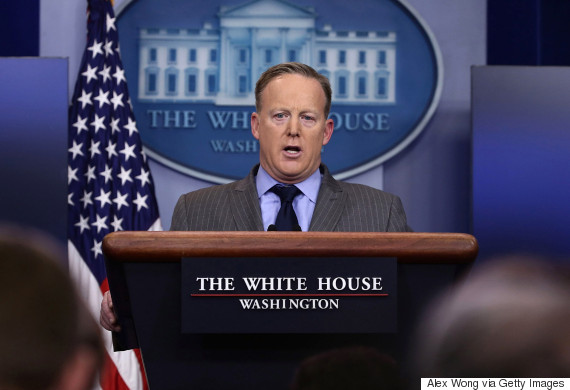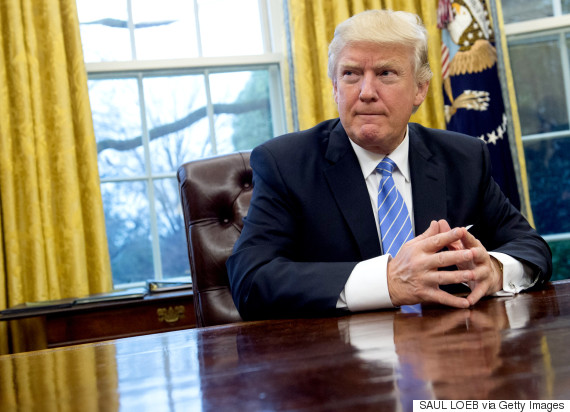WASHINGTON — Prime Minister Justin Trudeau will meet the new U.S. president within the next several weeks, as the incoming American administration talks to its northern and southern neighbours about a revised North American Free Trade Agreement.
A spokesman for Donald Trump confirmed the upcoming discussions as he held his first daily White House briefing Monday and took questions on trade, counter-terrorism and a dispute over him making misleading statements.
The first NAFTA talks could take place in the U.S., Sean Spicer suggested. He appeared to indicate the leaders would visit Trump. However, in Canada, several officials said specifics of a meeting had yet to be nailed down.
"(Trump) discussed on the phone with both leaders his desire to reform (NAFTA),'' Spicer told reporters. "His goal was to have that discussion when they come in person.''

Prime Minister Justin Trudeau takes addresses a news conference on Parliament Hill in Ottawa on Dec. 15, 2016.
Spicer said the meetings would happen soon: ''Over the next 30 days or so.''
Trade figured prominently in Trump's first full workday at the White House. The new president officially killed the Trans-Pacific Partnership by formally revoking U.S. participation in the 12-country trade pact.
That multinational agreement had been a pillar of U.S. foreign policy under two administrations, an effort to set American-designed trade standards in China's geographic neighbourhood, and Canada was also a party. However, the deal drew fire from left and right in the last U.S. election and now appears dead.
Trump met business leaders and promised a carrot-and-stick approach: lower taxes and a 75-per-cent reduction in regulations for businesses that stay in the U.S., and tariff-like punishments for businesses that outsource jobs.
Media, Trump team spat over inauguration
Another subplot of the day featured a spat over basic honesty. Spicer admitted he misled reporters on the weekend by exaggerating the number of Washington subway riders on the day of Trump's inauguration.
He said it was an honest mistake and that he had received bad numbers. Spicer did continue to insist that Trump's inauguration crowd was the largest of all time — but he clarified that the claim included live participants, TV viewers and people who watched online.
Attention now turns to NAFTA.

White House Press Secretary Sean Spicer makes a statement to members of the media at the White House on Jan. 21, 2017 in Washington, DC.
The Canadian government heard a reassuring message in Calgary. A presidential adviser attended a federal cabinet retreat to say Canada need not be "enormously worried'' about trade. Stephen Schwarzman, who leads the president's Strategic and Policy Forum, said the new administration had an "unusually positive'' view of Canada.
"There may be some modifications, but basically things should go well for Canada in terms of any discussions with the United States,'' said Schwarzman, CEO of the Blackstone Group investment firm.
The Canadian government has been hoping to escape the ire that Trump directed at other countries during the campaign — he almost never mentioned Canada and in fact brushed off the idea of a northern border wall when asked about it.
"Basically things should go well for Canada."
The Trudeau government has hinted it could even seek to preserve a one-on-one deal with the U.S., should NAFTA fall apart.
"The reality is that we will do what is in Canada's interest,'' said David MacNaughton, Canada's ambassador to the U.S., when asked in a December interview about the possibility of an agreement without Mexico.
A former Bush-era trade secretary urged the parties to save the trilateral pact.

U.S. President Donald Trump prepares to sign several executive orders in the Oval Office of the White House in Washington, D.C., on Monday.
Robert Zoellick said breaking up the NAFTA zone would be a strategic setback for North America — and he encourages Canada and Mexico to work together, even by sharing information and intelligence during trade talks.
"I've heard some Canadian voices say, 'Hey, remember, we've got the Canada free trade agreement. If you lose NAFTA, we've still got one — (and it's) back to 1988.' I think that would be deeply unfortunate,'' the former U.S. trade representative told a panel discussion last week at Washington's Wilson Center.
He said Canada might also consider aligning itself with any bilateral deal between Trump and the United Kingdom, as it leaves the European Union. He called it an opportunity, at a time other doors are closing: "In trade, if you're not on offence you're on defence. It's better to be pushing open markets as opposed to closed markets.''
-- This feed and its contents are the property of The Huffington Post, and use is subject to our terms. It may be used for personal consumption, but may not be distributed on a website.